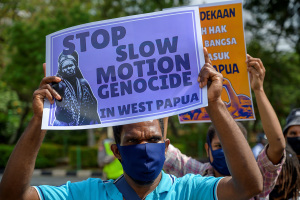Largest Ecumenical Body Gains Eight New Members
The World Council of Churches extended its membership to eight new churches. At the same time, five WCC member churches underwent organizational changes and merged into two joint fellowships, increasing the total Council membership from 342 to 347.
The World Council of Churches (WCC) extended its membership to eight new churches, during its central committee meeting in Geneva, Switzerland, on Tuesday, February 15, 2005. At the same time, five WCC member churches underwent organizational changes and merged into two joint fellowships, increasing the total Council membership from 342 to 347.
Of the eight new members, only five were received as full members; the other three were received as new associate members.
The five full members are: Evangelical Baptist Church in Angola, African Church (Nigeria), Protestant Evangelical Church of Guinea, Methodist Church in Indonesia and Baptist Convention of Haiti.
The three new associate members are: Association of Evangelical Reformed Churches of Burkina Faso, Presbyterian Church of Colombia, and the Methodist Church of Puerto Rico.
Meanwhile, six other churches formally completed the membership process and are expected to join the WCC immediately after the Council¡¯s long-awaited 9th assembly in Porto Alegre, Brazil, in 2006.
According to the WCC, churches applying for membership must fulfill a number of criteria, the first being a membership cap. Any church wishing to be considered must have a minimum membership cap of 25,000. Churches with less than the minimum cap may be accepted as an ¡°associate¡± member, pending review by the central committee. A second criterion is the requirement that the applicant be working ecumenically in their local region.
At least one visit by an ecumenical delegation is made to the church before the applicant is accepted.
Under a separate category, the central committee accepted two joint membership applications: The Protestant Church in the Netherlands and the Moravian Church British Province and European Continental Province of the Moravian Church (EFBU).
The first is the merger of the former Netherlands Reformed Church, the Reformed Churches in the Netherlands, and the Evangelical Lutheran Church in the Kingdom of the Netherlands -- all three of which were WCC members.
The second is the merger of the European Continental Province of the Moravian Church with the Moravian Church British Province, both individual members of the Council.
Meanwhile, two churches expressed the desire to leave the WCC fellowship: the Evangelical Methodist Church of Costa Rica (Costa Rica); and the International Evangelical Church (USA).




























